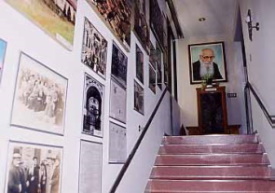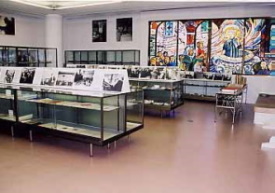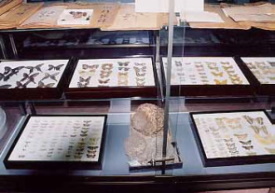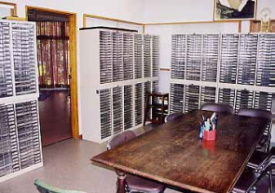Exhibits at the Cimatti Museum
More and more people are visiting the Cimatti Museum, and their impressions are:、
"That's amazing! I had no idea such valuable things existed. I'm amazed at what Father Cimatti has collected!"
If you have time to look around, you'll find plenty to explore: music, old books, fossils, Japanese nature specimens, pre-war and wartime history, and more!
Father Cimatti, a doctor of natural sciences, wanted to create a similar museum in Japan, modeled after the one at the Valsalice College in Turin, Italy.
The idea was that in studying natural sciences, students should not only use textbooks, but also observe the real thing.
Some people have said that there has never been such an educational museum in Japan.
Before the war, Father Cimatti ordered fossil and mineral specimens from abroad and collected plants, insects, and shellfish from Japan for
the Salesian Seminary in Miyazaki, and displayed them in the classroom. After the war, he continued to collect them, and kept them at the Salesian Seminary in Chofu.
They are now on display at the Cimatti Museum along with his musical compositions.
This museum was made possible in 1983 through the efforts of Father Crevacore, who was then in charge of Father Cimatti's beatification research.
Located on the grounds of Salesio Seminary, the building features a bust relief of Father Cimatti. The windows are decorated with Italian stained glass,
and there is an office and music reference room on the first floor and an exhibition room on the second floor.
The reference room on the first floor and the exhibition room on the second floor house the following important materials:
・Father Cimatti composed more than 950 compositions, including the first opera in Japan, "Hosokawa Gracia,"
more than 40 operas, 19 masses, and numerous songs for liturgy and public use. Many CDs and DVDs have been produced.
・The book contains his writings and around 6,300 letters. From these were excerpted two volumes of
"The Autobiography He Never Wrote."
・Thousands of photographs of him and numerous newspaper articles about him.
・Numerous programs for approximately 2,000 concerts.
・Numerous fossils, plants, insects, shellfish, and mineral specimens collected by him.
・Records for beatification investigations and their public documentation.
・Books, equipment, clothing, etc. used by him.
・The library includes books related to theology, the Bible, church history, and Christian history from the 1500s to the 1800s
that the priest ordered for the Salesian Seminary library, as well as books related to the Japanese Bible and materials
related to Father Mario Marega.
Cimatti Museum attracts attention from Japanese academic journals
Journal of the International Society for Historical Studies in Japan「Historia scientiarum」
The March 2018 issue of the magazine carried a 17-page article co-authored by G.B. Vai, the world-famous director of the Museum of Geology at the University of Bologna in Italy,
and S. Marabini, and supervised by Professor Toshihiro Yamada of the Department of Archaeology at the University of Tokyo.
Father Cimatti, who is also a doctor of natural sciences, believes that in studying natural sciences one should not only use textbooks but also observe the real thing,
so he modeled the museum at the Valsalice Academy in Turin, Italy, and tried to create something similar in Japan.
Before the war, Father Cimatti ordered fossil and mineral specimens from abroad and collected plants, insects, and shellfish from Japan for the Salesian Seminary in Miyazaki,
and displayed them in the classrooms.
During his lifetime, Father Cimatti had contact with the museum at the University of Bologna, and would send them fossils and other items.
He continued to collect them after the war, and preserved them at the Salesio Seminary in Chofu.
They are now on display at the Cimatti Museum.
Of particular interest are the fish and plant fossils sent from Borca in Italy. They date back about 1.5 million years and, thanks to the geology of the area,
have been preserved very clearly. They are world famous and probably cannot be found anywhere else in Japan.
After visiting the Cimatti Museum, Marabini realized this and decided that he should visit the museum with his close friend, Professor Toshihiro Yamada,
to spread the word about the museum. Professor Toshihiro Yamada also thought that there was probably no precedent for a museum like this in Japan that was for educational purposes.
Tours etc.
(The priest may not be present at times.)
(If the day falls on a Sunday, it will be held in the same chapel at the same time on the following Monday.)
The anniversary of Father Cimatti's death is October 6, 1965.
A person who received a blessing in hopes of being introduced to Father Cimatti.
We will send you information about events and activities. (Please note that the priest may not be present at the time.)
Telephone/Fax: 042-490-6707 Direct line to Father Marsilio: 090-9245-3061
email address
Salesian Seminary Call Phone 042-482-3117



